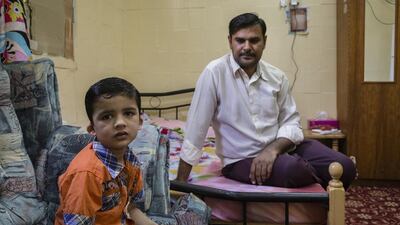ABU DHABI // For nearly a year, Gulam Maiyuddin has been travelling between the UAE and India, trying to get a charity to help pay for surgery that will help his son to hear.
Mr Maiyuddin’s son, Abdullah, 3, was born without an inner ear – a rare condition that occurs in about one in every 10,000 births.
The family did not realise that their youngest child was deaf until a year ago.
Abdullah has microtia-anotia, which affects the size and shape of the ear, but in his case there is little external deformity, so it went unnoticed.
“When my son was born, doctors told us that everything was OK,” says Mr Maiyuddin.
“I started getting worried when he didn’t speak by the time he was two years old, and my mother told me it was normal for children to speak late.”
After observing that his son did not respond to sounds or to his parents’ call, Mr Maiyuddin took Abdullah to a UAE hospital.
When doctors told Mr Maiyuddin and his wife that Abdullah was deaf in both ears, Mr Maiyuddin says it “was the worst day in my life”.
“We have accepted it now. It was very hard on me and my wife, but now it’s easier because we have hope,” he says.
Their hope lies in an operation for an implant that would help Abdullah to hear.
However, the operation is not available in the UAE, and Mr Maiyuddin wants to take his son to India for the procedure.
“The surgery for an auditory brain-stem implant is only available in the US, a few European countries and in India,” he says.
“I know the language and although we live nine hours away and I have no family in that area, it’s cheaper and easier than anywhere else.”
The surgery costs Dh110,000, which Mr Maiyuddin is unable to afford. The father of three is a tailor in Al Ain and earns Dh3,500 each month.
“I heard that the charities could help me but they asked for many documents,” says Mr Maiyuddin, who needed about a year to produce the necessary paperwork.
“I had to go back to India and to get a medical report from the doctor. I sold everything I had and borrowed money so that I can buy tickets for me and my wife,” he says.
Adding to the cost was the expense of staying more than two weeks in New Delhi, where they waited to meet the surgeon.
“The doctor was very busy and could not accommodate us as soon as we arrived, so we had to stay there till he could meet us,” says Mr Maiyuddin.
He has applied to charities but has had no replies. Charities are flooded with requests during Ramadan.
“My only hope to get any assistance is through Helping Hands,” says Mr Maiyuddin.
“Abdullah is my youngest son and we are not planning to have more children. I would do anything to hear him call out my name and hear my voice when I call him.”
Hisham Al Zahrani, manager of zakat and social services at Dar Al Ber Society, says that without donations from the community, “it is a challenge for any charity to bear the entire cost of the surgery”.
“We are asking for the community to help in supporting cases such as Abdullah’s and many others who are in desperate need of our assistance,” says Mr Al Zahrani.
salnuwais@thenational.ae

